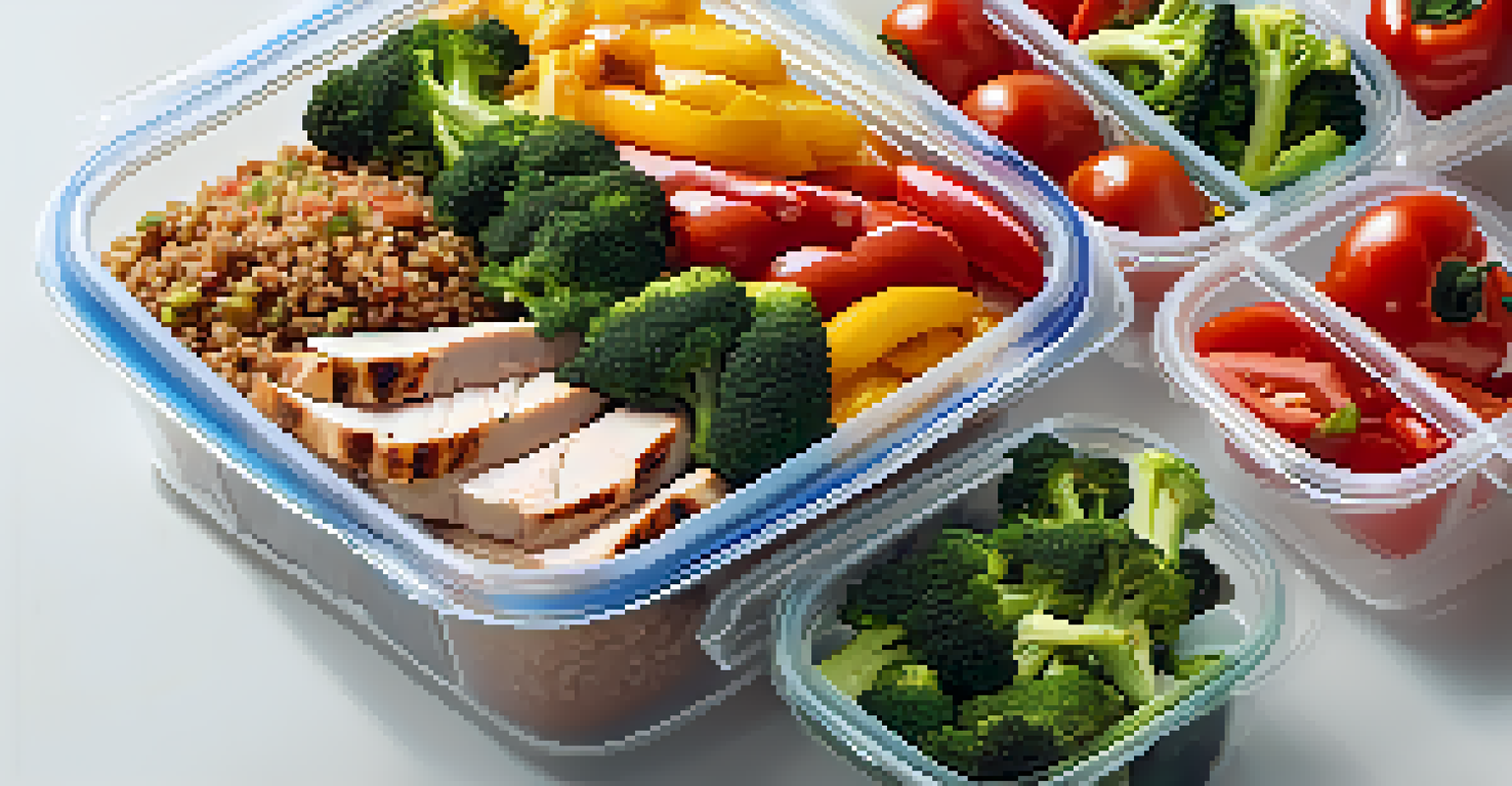How Stress Influences Nutritional Choices and Health

Understanding the Connection Between Stress and Nutrition
Stress is a natural response to challenges, but it can significantly impact our food choices. When faced with stress, many people turn to comfort foods, which are often high in sugar and fat. This instinctive shift in eating habits can create a cycle where stress leads to poor nutrition, which in turn can exacerbate stress levels.
The greatest weapon against stress is our ability to choose one thought over another.
Research shows that stress activates the body's fight-or-flight response, triggering hormonal changes that influence appetite. For instance, cortisol, a hormone released during stress, can increase cravings for unhealthy foods. This means that when we're stressed, our bodies may actually be pushing us toward less nutritious options.
Understanding this connection is crucial for managing both stress and nutrition. By recognizing how stress affects our eating behaviors, we can take proactive steps to make healthier choices, even in tough times.
The Role of Emotional Eating in Stressful Times
Emotional eating is a common response to stress, where individuals seek solace in food. This behavior often leads to consuming high-calorie snacks or meals that provide temporary relief but lack nutritional value. For many, this cycle becomes a way to cope with emotions rather than addressing the underlying stressors.

When we eat to soothe our emotions, we might overlook the importance of balanced nutrition. This can lead to feelings of guilt or shame, creating a negative feedback loop that further compounds stress. It's essential to recognize that while food can be comforting, it shouldn't become a primary coping mechanism.
Stress Influences Food Choices
When stressed, people often gravitate towards unhealthy comfort foods, creating a cycle that exacerbates both stress and poor nutrition.
Finding alternative stress-relief techniques, such as exercise, meditation, or talking to a friend, can help break the cycle of emotional eating. By exploring healthier coping strategies, we can nourish our bodies and minds more effectively.
The Impact of Stress on Digestive Health
Stress doesn't just influence what we eat; it also affects how our bodies process food. When we're stressed, our digestive system can slow down or operate inefficiently, leading to discomfort and digestive issues. This interference can make it harder for our bodies to absorb the nutrients we need.
Take care to get what you like or you will be forced to like what you get.
Conditions like irritable bowel syndrome (IBS) are often exacerbated by stress, further complicating the relationship between our mental state and digestive health. As stress levels rise, so can symptoms like bloating, gas, and irregular bowel movements. This can create a vicious cycle, where digestive discomfort adds to our stress levels.
Maintaining a balanced diet rich in fiber, probiotics, and hydration can support digestive health, even during stressful periods. Incorporating stress-reducing practices such as yoga or mindfulness can also promote better digestion and overall well-being.
Nutritional Deficiencies Linked to Chronic Stress
Chronic stress can lead to nutritional deficiencies as it often disrupts regular eating patterns. Individuals under prolonged stress may skip meals or opt for convenience foods that lack essential nutrients. Over time, this can result in deficiencies that impact physical and mental health.
For instance, stress can deplete levels of vitamins like B12 and magnesium, which are crucial for energy production and mood regulation. These deficiencies can manifest as fatigue, irritability, and decreased cognitive function, further complicating stress management. It's a cycle that can be challenging to break.
Emotional Eating Can Exacerbate Stress
Emotional eating often leads to guilt and shame, further complicating stress management and nutrition.
To combat these deficiencies, incorporating a variety of nutrient-dense foods is important. This includes fruits, vegetables, whole grains, and lean proteins to support overall health and resilience against stress.
Choosing Healthy Foods During Stressful Situations
Making healthy food choices during stressful times can feel overwhelming, but it is possible with some planning. When stress strikes, having accessible healthy snacks can make a significant difference. Think of options like nuts, fruits, or yogurt that can provide immediate nourishment without added guilt.
Meal prepping can also be a game-changer. By preparing balanced meals in advance, you can avoid the temptation of unhealthy fast food when stress levels rise. This proactive approach ensures you have healthy options readily available, reducing the likelihood of impulsive choices.
Additionally, practicing mindfulness while eating can help you reconnect with your body's hunger signals. By focusing on your meals and savoring each bite, you can make more intentional choices that satisfy both your body and your emotions.
The Importance of Hydration Under Stress
Hydration is often overlooked during stressful times, yet it's crucial for maintaining overall health. When stressed, people may forget to drink enough water, which can lead to dehydration. This can exacerbate feelings of fatigue and stress, creating a downward spiral in both physical and mental well-being.
Dehydration can also affect cognitive function, making it harder to think clearly and manage stress effectively. This can lead to poor decision-making, including unhealthy food choices. Therefore, staying hydrated is a simple yet powerful way to combat stress and support better nutrition.
Hydration Supports Stress Management
Staying hydrated is essential for maintaining both physical and mental well-being, especially during stressful times.
To ensure adequate hydration, keep a water bottle handy throughout the day. Incorporating hydrating foods, such as fruits and vegetables, can also contribute to your overall fluid intake, helping to keep stress levels in check.
Building Resilience Through Nutrition and Lifestyle Changes
Building resilience against stress involves not just nutrition but also lifestyle changes that promote overall well-being. Regular physical activity, for example, can help reduce stress levels and improve mood. Pairing exercise with a balanced diet creates a strong foundation for managing stress effectively.
Mindfulness practices, such as meditation and deep breathing exercises, can also enhance resilience. These techniques help calm the mind and body, making it easier to make healthier food choices even in stressful moments. The key is to find what works best for you and incorporate it into your daily routine.

Ultimately, by prioritizing both nutrition and lifestyle changes, we can better equip ourselves to handle stress. This holistic approach not only supports our physical health but also fosters a positive mindset, enabling us to thrive even in challenging situations.